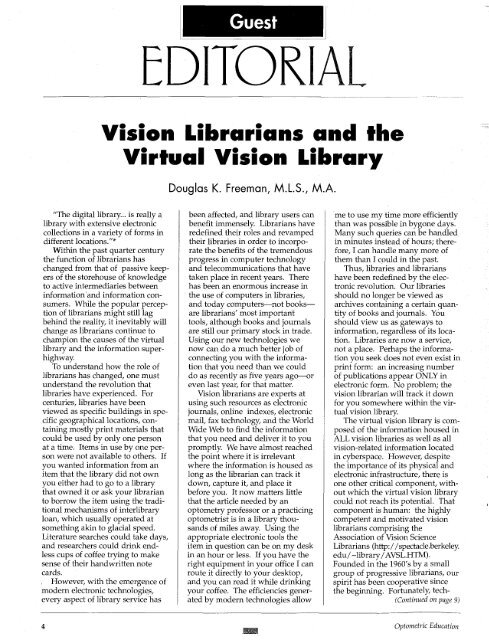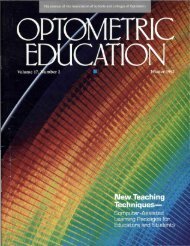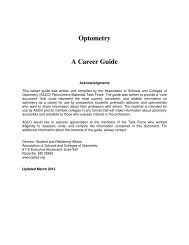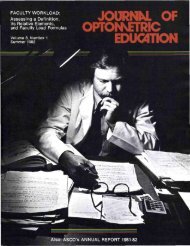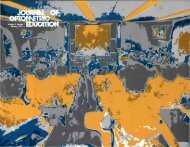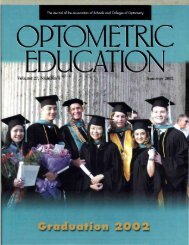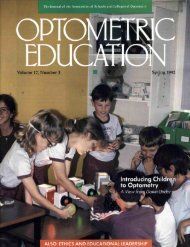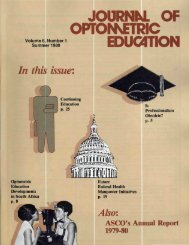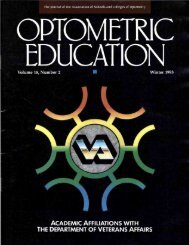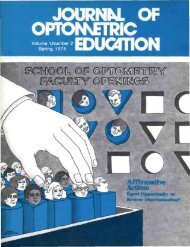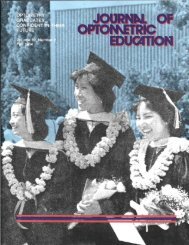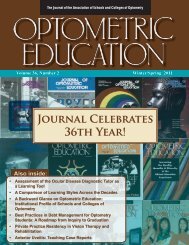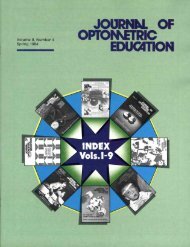Fall 1997, Volume 23, Number 1 - Association of Schools and ...
Fall 1997, Volume 23, Number 1 - Association of Schools and ...
Fall 1997, Volume 23, Number 1 - Association of Schools and ...
You also want an ePaper? Increase the reach of your titles
YUMPU automatically turns print PDFs into web optimized ePapers that Google loves.
Guest<br />
ORIA<br />
Vision Librarians <strong>and</strong> the<br />
Virtual Vision Library<br />
Douglas K. Freeman, M.L.S., M.A.<br />
"The digital library... is really a<br />
library with extensive electronic<br />
collections in a variety <strong>of</strong> forms in<br />
different locations."*<br />
Within the past quarter century<br />
the function <strong>of</strong> librarians has<br />
changed from that <strong>of</strong> passive keepers<br />
<strong>of</strong> the storehouse <strong>of</strong> knowledge<br />
to active intermediaries between<br />
information <strong>and</strong> information consumers.<br />
While the popular perception<br />
<strong>of</strong> librarians might still lag<br />
behind the reality, it inevitably will<br />
change as librarians continue to<br />
champion the causes <strong>of</strong> the virtual<br />
library <strong>and</strong> the information superhighway.<br />
To underst<strong>and</strong> how the role <strong>of</strong><br />
librarians has changed, one must<br />
underst<strong>and</strong> the revolution that<br />
libraries have experienced. For<br />
centuries, libraries have been<br />
viewed as specific buildings in specific<br />
geographical locations, containing<br />
mostly print materials that<br />
could be used by only one person<br />
at a time. Items in use by one person<br />
were not available to others. If<br />
you wanted information from an<br />
item that the library did not own<br />
you either had to go to a library<br />
that owned it or ask your librarian<br />
to borrow the item using the traditional<br />
mechanisms <strong>of</strong> interlibrary<br />
loan, which usually operated at<br />
something akin to glacial speed.<br />
Literature searches could take days,<br />
<strong>and</strong> researchers could drink endless<br />
cups <strong>of</strong> c<strong>of</strong>fee trying to make<br />
sense <strong>of</strong> their h<strong>and</strong>written note<br />
cards.<br />
, However, with the emergence <strong>of</strong><br />
modern electronic technologies,<br />
every aspect <strong>of</strong> library service has<br />
been affected, <strong>and</strong> library users can<br />
benefit immensely. Librarians have<br />
redefined their roles <strong>and</strong> revamped<br />
their libraries in order to incorporate<br />
the benefits <strong>of</strong> the tremendous<br />
progress in computer technology<br />
<strong>and</strong> telecommunications that have<br />
taken place in recent years. There<br />
has been an enormous increase in<br />
the use <strong>of</strong> computers in libraries,<br />
<strong>and</strong> today computers—not books—<br />
are librarians' most important<br />
tools, although books <strong>and</strong> journals<br />
are still our primary stock in trade.<br />
Using our new technologies we<br />
now can do a much better job <strong>of</strong><br />
connecting you with the information<br />
that you need than we could<br />
do as recently as five years ago—or<br />
even last year, for that matter.<br />
Vision librarians are experts at<br />
using such resources as electronic<br />
journals, online indexes, electronic<br />
mail, fax technology, <strong>and</strong> the World<br />
Wide Web to find the information<br />
that you need <strong>and</strong> deliver it to you<br />
promptly. We have almost reached<br />
the point where it is irrelevant<br />
where the information is housed as<br />
long as the librarian can track it<br />
down, capture it, <strong>and</strong> place it<br />
before you. It now matters little<br />
that the article needed by an<br />
optometry pr<strong>of</strong>essor or a practicing<br />
optometrist is in a library thous<strong>and</strong>s<br />
<strong>of</strong> miles away. Using the<br />
appropriate electronic tools the<br />
item in question can be on my desk<br />
in an hour or less. If you have the<br />
right equipment in your <strong>of</strong>fice I can<br />
route it directly to your desktop,<br />
<strong>and</strong> you can read it while drinking<br />
your c<strong>of</strong>fee. The efficiencies generated<br />
by modern technologies allow<br />
me to use my time more efficiently<br />
than was possible in bygone days.<br />
Many such queries can be h<strong>and</strong>led<br />
in minutes instead <strong>of</strong> hours; therefore,<br />
I can h<strong>and</strong>le many more <strong>of</strong><br />
them than I could in the past.<br />
Thus, libraries <strong>and</strong> librarians<br />
have been redefined by the electronic<br />
revolution. Our libraries<br />
should no longer be viewed as<br />
archives containing a certain quantity<br />
<strong>of</strong> books <strong>and</strong> journals. You<br />
should view us as gateways to<br />
information, regardless <strong>of</strong> its location.<br />
Libraries are now a service,<br />
not a place. Perhaps the information<br />
you seek does not even exist in<br />
print form: an increasing number<br />
<strong>of</strong> publications appear ONLY in<br />
electronic form. No problem; the<br />
vision librarian will track it down<br />
for you somewhere within the virtual<br />
vision library.<br />
The virtual vision library is composed<br />
<strong>of</strong> the information housed in<br />
ALL vision libraries as well as all<br />
vision-related information located<br />
in cyberspace. However, despite<br />
the importance <strong>of</strong> its physical <strong>and</strong><br />
electronic infrastructure, there is<br />
one other critical component, without<br />
which the virtual vision library<br />
could not reach its potential. That<br />
component is human: the highly<br />
competent <strong>and</strong> motivated vision<br />
librarians comprising the<br />
<strong>Association</strong> <strong>of</strong> Vision Science<br />
Librarians (http://spectacle.berkeley.<br />
edu/~library/AVSL.HTM).<br />
Founded in the 1960's by a small<br />
group <strong>of</strong> progressive librarians, our<br />
spirit has been cooperative since<br />
the beginning. Fortunately, tech-<br />
(Continued on page 9)<br />
Optometric Education


